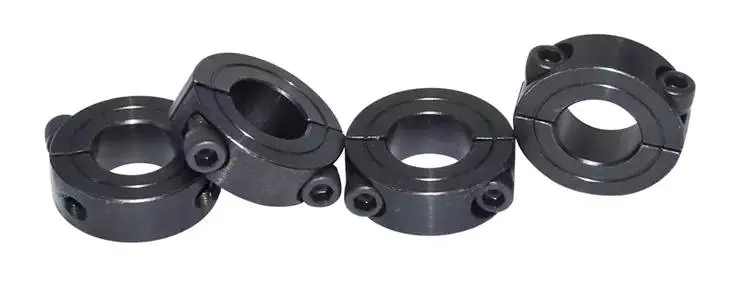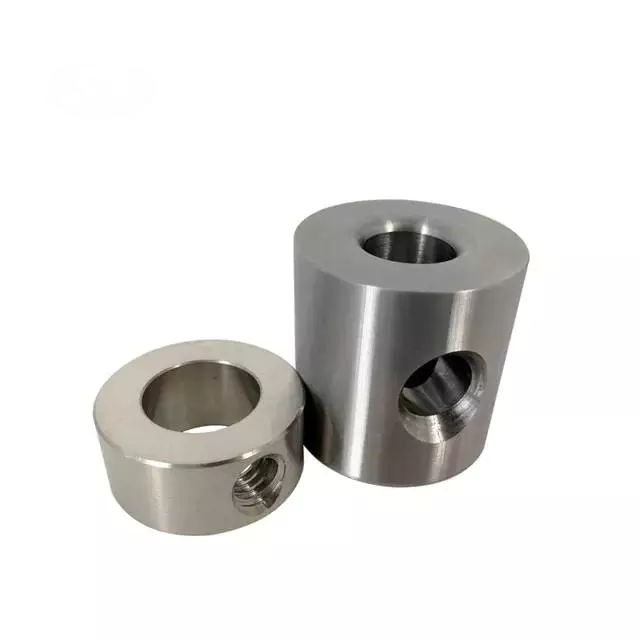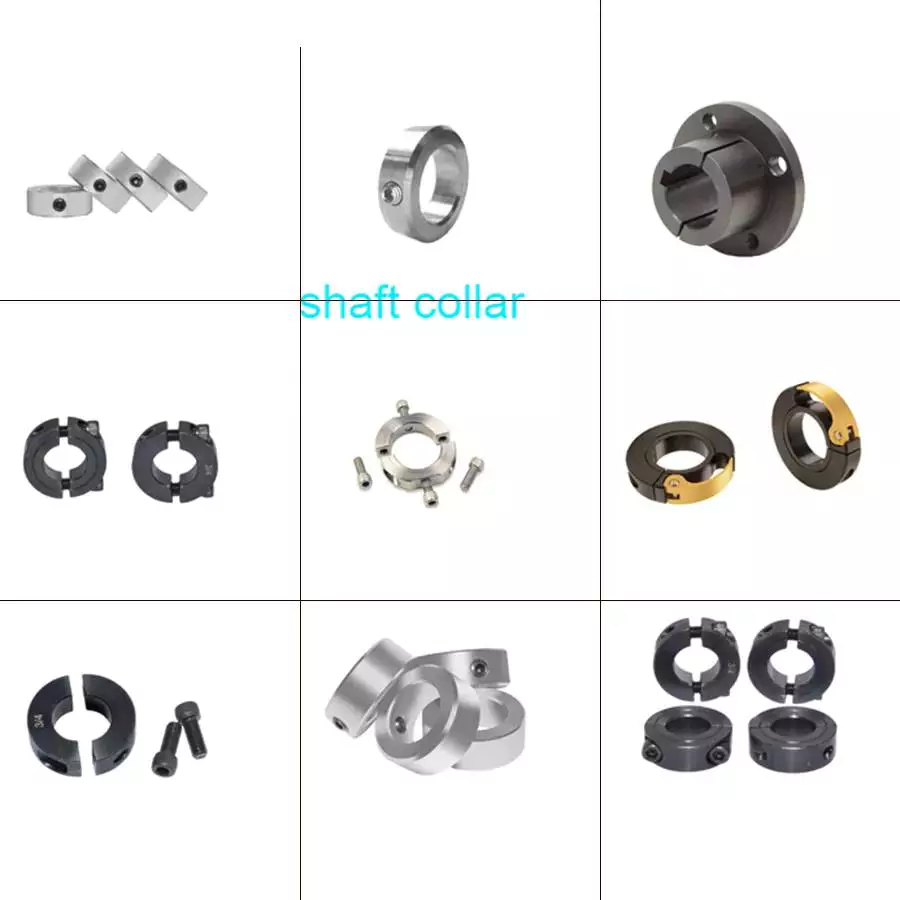
What are the temperature and corrosion resistance properties of shaft collars?
The temperature and corrosion resistance properties of shaft collars vary depending on the materials they are made of. Different materials exhibit different levels of resistance to temperature extremes and corrosion. Here are some commonly used materials for shaft collars and their temperature and corrosion resistance properties:
- Steel: Steel shaft collars, particularly those made from stainless steel, offer excellent temperature and corrosion resistance properties. Stainless steel is known for its high strength, durability, and resistance to rust and corrosion. It can withstand a wide range of temperatures, from low cryogenic temperatures to high heat environments. Stainless steel shaft collars are often used in applications where exposure to moisture, chemicals, or harsh environments is a concern.
- Aluminum: Aluminum shaft collars have good temperature resistance properties and can handle moderate temperature ranges. They are lightweight and offer reasonable corrosion resistance. However, aluminum is not as corrosion-resistant as stainless steel and may be susceptible to certain chemicals or highly corrosive environments. Aluminum shaft collars are commonly used in applications where weight reduction is a priority, such as aerospace or automotive industries.
- Plastic: Plastic shaft collars, such as those made from nylon or acetal, have limited temperature resistance compared to steel or aluminum. They can typically handle moderate temperatures but may deform or degrade at higher temperatures. Plastic collars are not as resistant to corrosion as metal collars but can still offer good resistance to certain chemicals and environmental conditions. Plastic collars are often used in applications where weight, cost, or electrical insulation properties are important factors.
- Brass: Brass shaft collars offer good temperature resistance and moderate corrosion resistance. They can handle a range of temperatures and are often used in applications where a combination of durability, conductivity, and aesthetics is required. Brass collars may tarnish over time but can still maintain their functionality and structural integrity.
It is important to note that the temperature and corrosion resistance properties of shaft collars can also be influenced by factors such as the specific alloy composition, surface treatments, and environmental conditions they are exposed to. When selecting shaft collars for your application, it is crucial to consider the temperature range and potential exposure to corrosive substances or environments. Consulting with manufacturers, reviewing technical specifications, and considering industry standards or guidelines can help ensure that you choose shaft collars with appropriate temperature and corrosion resistance properties for your specific needs.

Can I find guidelines on lubricating and maintaining shaft collars for optimal performance?
Yes, guidelines on lubricating and maintaining shaft collars for optimal performance can be found. Proper lubrication and maintenance are essential for ensuring the smooth operation and longevity of shaft collars. Here are some common sources where you can find guidelines on lubricating and maintaining shaft collars:
- Manufacturer Websites: Many shaft collar manufacturers provide guidelines or recommendations for lubrication and maintenance on their websites. These guidelines may include information on the type of lubricant to use, the frequency of lubrication, and specific maintenance procedures. Visiting the websites of specific collar manufacturers and exploring their resources section or product documentation can help you find the lubrication and maintenance guidelines you need.
- Product Manuals or Documentation: When purchasing shaft collars, they often come with product manuals or documentation that include instructions for lubrication and maintenance. These manuals may provide step-by-step procedures, recommended lubricants, and maintenance schedules. Referencing the manuals or documentation that accompany your specific collar model can provide valuable guidance on how to properly lubricate and maintain your shaft collars.
- Industrial Machinery Handbooks: Handbooks or reference books related to industrial machinery or mechanical components often include sections on lubrication and maintenance practices. These resources can provide general guidelines and best practices for maintaining various types of mechanical components, including shaft collars. Checking reputable handbooks or reference books in the field of mechanical engineering can offer insights into lubrication techniques and maintenance procedures for optimal performance.
- Online Forums and Communities: Engaging with online industrial forums, discussion boards, or communities dedicated to mechanical components can provide access to valuable insights and experiences shared by professionals and experienced users. By posting inquiries about lubrication and maintenance techniques for shaft collars, you can gather practical advice, tips, and recommendations from individuals who have hands-on experience in the field.
- Consulting with Engineers or Experts: If you have access to engineers or experts in mechanical engineering or industrial equipment, they can provide personalized guidelines for lubricating and maintaining shaft collars based on your specific application and operating conditions. These professionals can consider factors such as the type of collar, the environment in which it operates, and any specific requirements you may have. They can offer insights and recommendations tailored to your needs.
When following lubrication and maintenance guidelines for shaft collars, it is important to adhere to the manufacturer’s recommendations and consider the specific characteristics of your operating environment. Proper lubrication techniques and regular maintenance can significantly contribute to the optimal performance and longevity of your shaft collars.

Can I find reviews on popular brands of shaft collars for user feedback?
Yes, it is possible to find reviews on popular brands of shaft collars to gain user feedback and insights. Here are some sources where you can look for reviews:
- Online Retailers: Online retailers such as Amazon, eBay, and industrial supply websites often feature customer reviews and ratings for products, including shaft collars. You can visit the product pages of specific brands or models of shaft collars and read user reviews to get an idea of their performance, quality, and user satisfaction. These reviews are typically provided by customers who have purchased and used the products, offering valuable feedback based on their experiences.
- Industrial Forums and Communities: Online industrial forums, discussion boards, or communities dedicated to mechanical components and equipment can be a valuable resource for finding user feedback on different brands of shaft collars. Participating in these communities and posting specific inquiries about certain brands or models can help you connect with industry professionals, engineers, or users who have firsthand experience with specific shaft collar brands. They can provide insights, recommendations, and share their opinions or experiences to assist you in making an informed decision.
- Manufacturer Websites: Some manufacturers maintain customer review sections or testimonials on their websites. Visiting the websites of popular shaft collar brands and exploring their product pages or customer support sections may provide access to reviews or feedback from users who have used their specific products. Manufacturer websites often include case studies, application examples, or testimonials that can give you an idea of the performance and user satisfaction associated with their shaft collars.
- Professional Publications and Magazines: Professional publications, trade magazines, or industry-specific journals related to mechanical engineering, industrial equipment, or power transmission may feature product reviews or evaluations. These publications often conduct independent tests, assessments, or interviews with professionals in the field to provide objective insights and feedback on various products, including shaft collars. Checking these publications or their online platforms can give you access to expert opinions and evaluations.
- Social Media and Online Groups: Social media platforms like LinkedIn or Facebook may have industry-specific groups or communities where professionals and enthusiasts discuss mechanical components and equipment. Joining these groups and engaging in conversations can help you connect with individuals who can provide feedback or recommendations based on their experiences with different brands of shaft collars.
When reading reviews, it’s important to consider multiple sources and evaluate the overall consensus rather than relying solely on individual opinions. Look for patterns, common experiences, and consider the credibility of the sources providing the reviews. Keep in mind that user feedback can vary, and personal preferences or specific application requirements may influence opinions. By gathering insights from various sources, you can make a more informed decision about the popular brands of shaft collars and their suitability for your specific needs.


editor by CX 2023-12-04